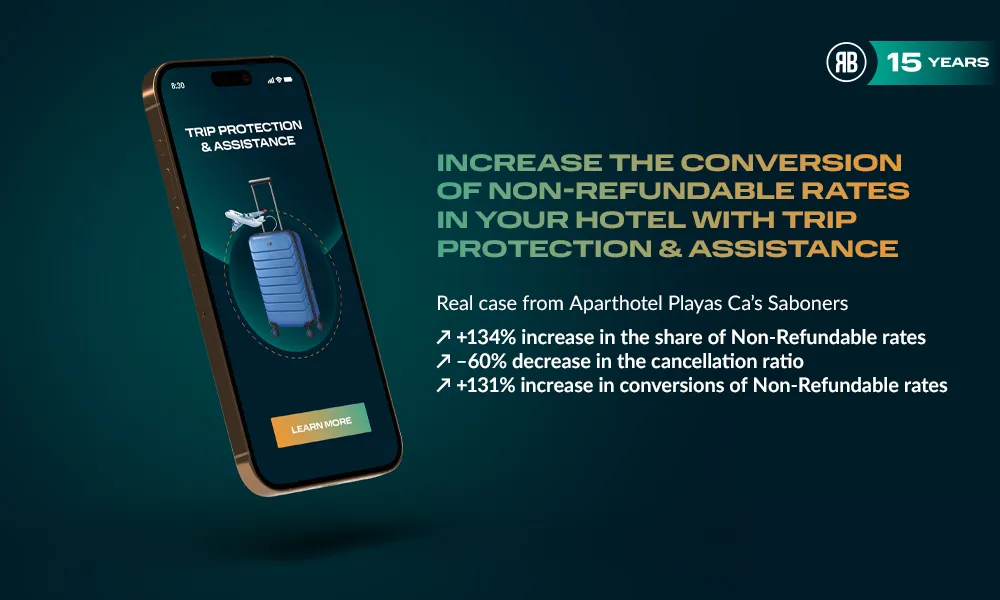Savings and sustainability: how to reduce your hotel's operating costs before the high season
News
April 8, 2025

Content in collaboration with our partner Bioscore Sustainability, sustainability consultancy for tourism companies.
With the high season just around the corner, many hotels are preparing to meet increased demand, increase occupancy, and optimize revenue. However, this period also implies a significant increase in operating costs, especially in consumption such as water, energy, or waste management. In this context, applying sustainability criteria is not only a way to contribute to the care of the planet, but also an effective strategy to improve the efficiency and profitability of the business.
Next April 22 is Earth Day, a key date that invites reflection on the environmental impact of our decisions and an opportunity to remember that sustainability can go hand in hand with savings. In this article, Roiback and Bioscore Sustainability want to share with you some keys to preparing your hotel before the peak of tourist activity from a sustainable and results-oriented perspective.
The environmental impact of the hotel sector: a call to action
According to the United Nations Environment Programme (UNEP), the hotel sector accounts for approximately 1% of global greenhouse gas emissions, a figure that could increase if sustainable measures are not adopted. In addition, hotels are large consumers of water and energy. A study by the International Tourism Partnership estimates that an average hotel consumes between 170 and 440 liters of water per guest per day, and air conditioning, lighting and laundry account for a large part of electricity consumption.
These data show the challenge facing the sector, but also the potential for improvement. Reducing environmental impact does not have to involve large investments. On the contrary, many sustainable measures allow operating costs to be reduced in a tangible, rapid and measurable way.
How to reduce costs sustainably before the high season
1. Optimize water consumption
The installation of low-flow devices, preventive maintenance to avoid leaks, or the revision of washing cycles in the laundry are some of the most effective actions to reduce water consumption without affecting the guest experience. In addition, integrating consumption indicators per stay allows deviations to be detected and corrected in time.
2. Improve energy efficiency
Taking advantage of natural light, replacing obsolete equipment with more efficient versions, reviewing air conditioning systems, or using presence sensors are measures that reduce energy consumption. Implementing an energy efficiency policy adapted to the profile of the establishment helps reduce costs throughout the season.
3. Manage waste better
The kitchen, the breakfast buffet or the use of single-use amenities are areas where you can act immediately. Adopting a waste reduction strategy, promoting selective separation, and collaborating with local suppliers that minimize packaging can reduce both the volume of waste generated and the costs associated with its management.
If you want to know more, you can retrieve our article 5 reasons to change your amenities for more sustainable alternatives.
4. Train staff and involve guests
The change towards a more sustainable model is only possible if it involves the entire team. Training in good practices and defining clear procedures are essential. Likewise, communicating the measures adopted to the client in a transparent way contributes to improving their perception of the accommodation and encourages a more responsible use of resources during their stay.
Blue Leaf Bioscore: a tool to measure, improve and certify
Having a management and certification tool such as the one offered by Bioscore Sustainability allows hotels to have a comprehensive view of their environmental performance, identify areas for improvement and communicate their commitment clearly. Through its digital platform, hotels can record key indicators in terms of water, energy, waste, carbon footprint and other aspects related to sustainability.
The Blue Leaf Bioscore certificate, aligned with the international standards of the Global Sustainable Tourism Council (GSTC), demonstrates a hotel's commitment to sustainability. This certification not only provides rigor and traceability but also improves positioning with customers and agencies, who are increasingly interested in responsible accommodations.
Sustainability as a competitive advantage
Every decision made today regarding sustainability can have a direct positive impact on the hotel's results during the high season. In addition to reducing costs, these actions improve brand reputation, ensure compliance with current environmental regulations, and provide access to market segments with high ecological awareness.
Earth Day is a reminder that sustainability cannot remain just talk. It is about acting. And in the hotel sector, acting also means optimizing operations, improving processes, and preparing intelligently for a demanding season.
From Roiback and Bioscore Sustainability, we encourage all hotels to advance on this path, combining technology, efficiency, and environmental commitment to build a more profitable industry aligned with global challenges.
Read more







